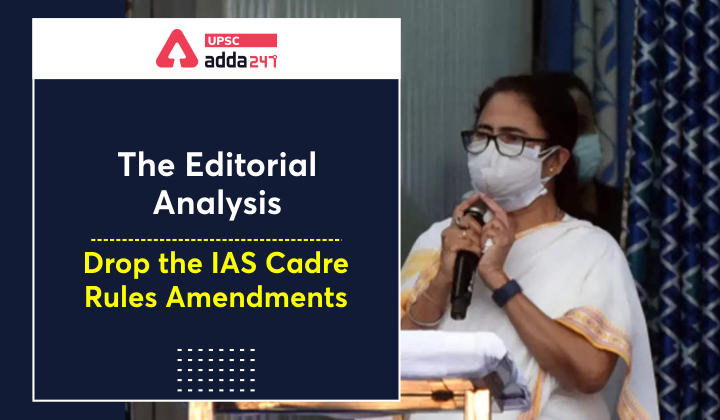Table of Contents
Drop the IAS Cadre Rules Amendments- Relevance for UPSC Exam
- GS Paper 2: Federalism- Functions and responsibilities of the Union and the States; Issues and challenges pertaining to the federal structure.
Drop the IAS Cadre Rules Amendments- Context
- Recently, the Central Government has proposed four amendments to Rule 6(1) of the IAS (Cadre) Rules, 1954 dealing with the deputation, and has sought the views of State governments.
- “All India Services” (AIS) members are recruited and appointed by the Centre and allotted to various States, and who could serve both under the State and the Centre.
IAS (Cadre) Rules 1954 | Centre to Amend IAS (Cadre) Rules
Drop the IAS Cadre Rules Amendments- Background
- Sardar Patel had championed the creation of the Indian Administrative Service (IAS) and the Indian Police Service (IPS) as “All India Services” (AIS).
- He considered the AIS essential-
- To knit the administrative framework of a vast and diverse country into an integrated whole and
- To provide a connecting link between implementation at the field level and policymaking at the top.
- Healthy Convention for Deputation: Few of the healthy conventions that were followed in the deputation process-
- No officer was sent on central deputation against his/her own will.
- Every year, the States would prepare an “offer list” of officers who had opted for central deputation without arbitrarily withholding any names.
- The Centre would choose officers only from among those “on offer” from the States.
- The States would relieve the officers picked up by the Centre at the earliest.
Drop the IAS Cadre Rules Amendments- IAS Cadre Rules on Deputation
- Present Mechanism: The existing Rule 6(1) states that a cadre officer may be deputed to the Central Government (or to another State or a PSU) only with the concurrence of the State Government concerned.
- However, it has a proviso that states that in case of any disagreement, the matter shall be decided by the Central Government.
- Amendments to IAS Cadre Rules: Two contentious amendments are listed below-
- It makes it mandatory for the State government to provide a certain fixed number of IAS officers for central deputation every year.
- Issue: It compels a state government to offer IAS officers for central deputation even when these officers themselves may not wish to go on central deputation.
- It requires the State government to release such officers whose services may be sought by the Central Government in specific situations.
- Issue: States fear that this proviso may be misused for political considerations.
- It makes it mandatory for the State government to provide a certain fixed number of IAS officers for central deputation every year.
Drop the IAS Cadre Rules Amendments- Associated Issues with Deputation
- Proposed amendments pose a serious infringement of the rights to deploy IAS officers as they deem best.
- This is important as the cutting edge of policy implementation is mostly at the State level.
- Reasons for shortages of IAS officers-
- Poor working conditions in junior-level posts,
- An opaque and arbitrary system of empanelment for senior-level posts, and
- Lack of security of tenure at all levels.
- Further shortages of IAS officers: If States begin to doubt the loyalty of IAS officers, they are likely to reduce the number of IAS cadre posts and also their annual intake of IAS officers.
- States may prefer officers of the State Civil Services to handle as many posts as possible.
Drop the IAS Cadre Rules Amendments- Way Forward
- Promoting Constitutional Morality: The Centre should display a sense of constitutional morality, particularly a sense of justice and fairness towards the States.
- Upholding Federalism: Centre must uphold the spirit of Federalism with respect to states. In SR. Bommai vs Union of India (1994), the Supreme Court held that-
- States have an independent constitutional existence and they have as important a role to play in the political, social, educational and cultural life of the people as the Union.
- States are neither satellites nor agents of the Centre.
Drop the IAS Cadre Rules Amendments- Conclusion
- In a federal setup, it is inevitable that differences and disputes would arise between the Centre and the States.
- But all such quarrels should be resolved in the spirit of cooperative federalism and keeping the larger national interest in mind.




 TSPSC Group 1 Question Paper 2024, Downl...
TSPSC Group 1 Question Paper 2024, Downl...
 TSPSC Group 1 Answer key 2024 Out, Downl...
TSPSC Group 1 Answer key 2024 Out, Downl...
 UPSC Prelims 2024 Question Paper, Downlo...
UPSC Prelims 2024 Question Paper, Downlo...
